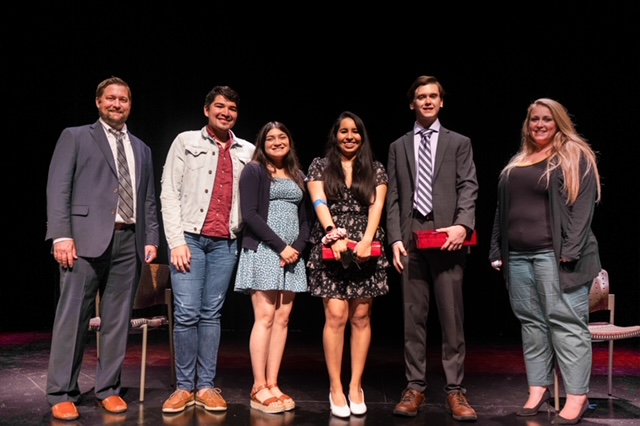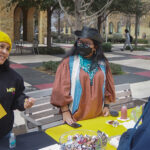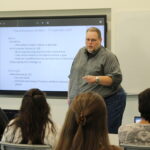Updated June 24: Goldstein informed The Mesquite he assumed the presidency as Aguinaga stepped down to pursue other opportunities.
As the spring 2021 semester wrapped up, the Student Government Association elected its new representatives for the upcoming year: graduate student Elena Aguinaga elected as president and cyber engineering sophomore Jacob Goldstein as vice president. Polls were open on JagSync on April 20 and 21; the two ran unopposed.
The president and vice president of SGA represent the student body of Texas A&M University-San Antonio and voice any concerns, comments or ideas students may have.
The Mesquite interviewed the new representatives through Zoom on May 11 to discuss their plans for their term. Aguinaga and Goldstein said their main goal is to increase the engagement between students and SGA.
Former SGA Vice President Armando Alanis encouraged both Aguinaga and Goldstein to join the association in fall 2020.
Alanis encouraged Aguinaga to join as a graduate senator in fall 2020. Aguinaga worked in the Mays Center for Experiential Learning alongside Alanis and interacted with “go-getter” undergraduate students.
“I knew I wanted to be involved like in some capacity and kind of give back as a graduate student, and so that really led me to run as president,” said Aguinaga, who studies clinical mental health.
After getting involved with the association, Goldstein acted as the student senator for the College of Business. He said it seemed like the right decision for him to run for vice president and be “an active and contributing member of student government.”
Before becoming a part of the association, Goldstein said he wasn’t aware of SGA’s presence on campus and what they did.
Goldstein said he hopes to make SGA more available to students on campus. Their goal is to have a full working student government to be at events and be available on campus for students.
SGA was lacking -”by no fault of anybody”- in size in comparison to past years, Goldstein said.
With everything virtual for SGA last year, the association saw a decrease in participation during senate meetings. The change to in-person senate meetings will show students SGA is active and also allow for senators to be more active, Goldstein said.
Classes will be held 70% face-to-face this upcoming semester. The increase in foot traffic on campus and hosting more in-person events will help SGA gain traction, Goldstein said.
“With the whole pandemic, I think a lot of people did lose track of us; just who we are and what we do,” Aguinaga said.
Aguinaga said she and Goldstein are brainstorming new traditions and activities to get students involved, along with continuing Madla Maroon Mondays.
Goldstein along with other members of SGA have already begun recruiting new members from other organizations.
His goals include creating a more well-rounded and diverse student senate.
SGA is seeing plenty of engagement from the College of Arts and Sciences but is lacking members from the College of Education. Goldstein said he wants to see more representation from education majors this year.
Along with diversity in majors, diversity in backgrounds is something the pair is hoping to see.
“Just trying to make sure that we have a little bit of everybody on our team will really benefit us in that (diversity) regard,” Goldstein said.
He is working toward more fair representation and diversity by reaching out to societies like Asian Student Association and Black Student Union to gain more members. This will help SGA figure out the issues facing students who are less represented on campus, Goldstein said.
Aguinaga said checking in with faculty and staff will also help the association track where students are struggling
As a larger amount of classes will be in-person, 30% of classes will remain online for the fall.
Trying to juggle both will be a big part of SGA’s effort, Goldstein said.
He said Dr. Mari Fuentes-Martin, vice president of student success and engagement, told him and Aguinaga that some students, particularly parents, may find it easier to do their classes after they put their kids to sleep.
As they focus on the upcoming semester, they are also reflecting on the past election and changes they want to make for the next one.
A lack of engagement with elections this year led students to be unaware and created an absence in candidates, Goldstein said. Word of SGA elections was also not made known publicly through social media and more.
Goldstein and Aguinaga want to create awareness of elections ahead of time and increase the number of candidates for next time. They want to avoid any missed opportunities for students wishing to run.
As they prepare to “hit the ground running” this fall, Aguinaga said supporting students in whatever capacity they need is their plan for this academic year.
Aguinaga wants students to know “there’s a group of students that they can turn to” for concerns, ideas, events and more.
Students can reach SGA at sga@jaguar.tamu.edu and can also follow them on Instagram @tamusasga.






